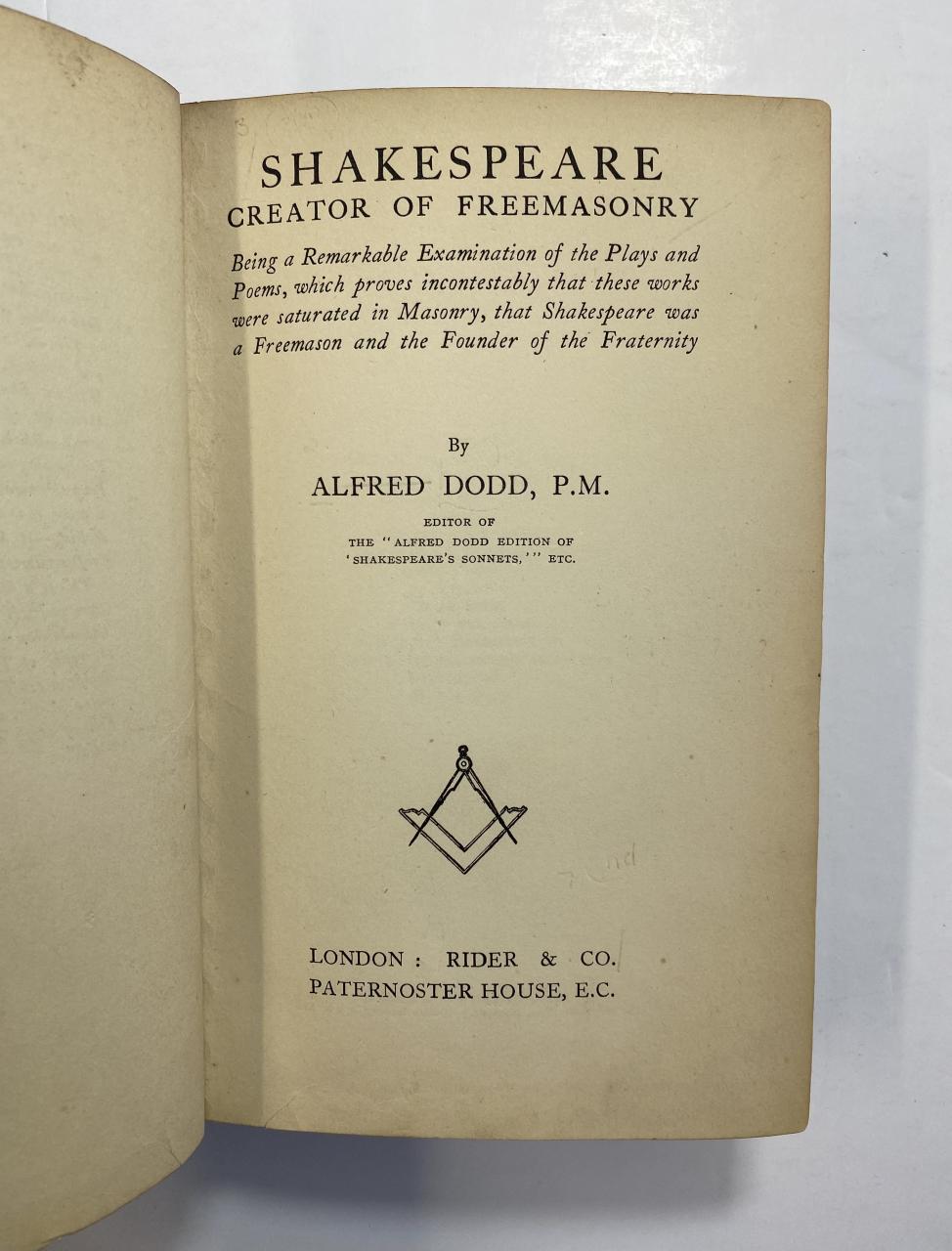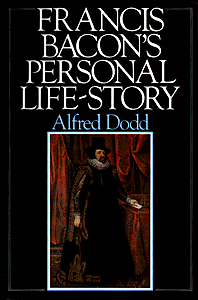
(Picture – The Shakespeare Monument erected in 1740. The crossed legs have a Rosicrucian significance. Shakespeare is pointing to the word Temples. A Masonic Temple is a room where a Masonic Lodge meets.)
The West has been saturated in Satanism without even knowing it.
Shakespeare was the founder (or pen name) for a school of Masons writing under his name, and such manuscripts, etc, were left to the custody of a succession of hands from the Elizabethan era onwards’.
by David Richards
(henrymakow.com)
A little-known book written by a high-ranking Freemason exposes the truth about Shakespeare. Shakespeare: The Creator of Freemasonry (1933) by Alfred Dodd argues that Shakespeare was a Freemason who encoded his plays with Masonic messaging. The work provides exhaustive and irrefutable evidence to support this view.
A mystery veils the life of William Shakespeare. The completed facts of his life could be written on a small sheet of notepaper, so little is known of him. Dodd states this is ‘due to the fact that William Shakespeare was a Freemason, the centre of a ring of Rosicrosse-Masons’.
At present there is not a single manuscript of the plays of Shakespeare to be found anywhere. There is not a single vestige of his handwriting in connection with literature. For Dodd, the complete disappearance of everything is too complete to be natural. ‘The inference can be drawn that the Grand Possessors were nothing less than the literary school of Rosicrosse-Masons of which Shakespeare was the founder (or pen name) and that such manuscripts, etc, were left to the custody of a succession of hands from the Elizabethan era onwards’.
The works of Shakespeare first appear in the 1623 Folio, seven years after the author’s death. In the preface, the Editors pointedly declare that Shakespeare was ‘A WORTHY FELLOW’ and urge the reader to read him again and again so that he is not misunderstood. Dodd explains, ‘the term “Fellow” was used in medieval times to signify particularly one who was a Mason. It is still used in Masonry today to signify the same thing… a Mason of a certain degree’.
Dodd provides evidence that Shakespeare’s plays are saturated with Masonry. There are secret signs and signals, cover words that look innocent, and double-meaning phraseology. These messages are ‘veiled yet clear enough to be understood by Masons. Such Masonic fragments would necessarily be embodied in the plays in such a manner as to arouse no suspicion… yet they ought to be plain enough to be recognised when taken out of their hiding places by the “discerning reader”.
These are just a small selection of the Masonic allusions.
A Knowledge of Noble Orders and Fraternities
I am a BROTHER of your GRACIOUS ORDER late come from the sea.
Measure for Measure, Act III, last scene.
I will, as twere a BROTHER OF YOUR ORDER, visit both PRINCE and PEOPLE
Measure for Measure, Act 1, s.4.
The Apron Men
You have made good work, you and your APRON MEN.
Coriolanus, Act IV, s.6.
The Lodge
Both are at THE LODGE.
Tito Andonicus, Act II, s.4.
The Junior Warden
Where is thy LEATHER APRON and thy RULE?
Julius Caesar, Act I, s.1.
The Prepared Candidate
I shall stay here the for-horse to A SMOCK (an apron), creaking my SHOES on the PLAIN MASONRY.
All’s Well that Ends Well, Act II, last scene.
Be patient… I’ll bring thee… HOODWINK this…
Speak softly… This is the mouth of THE CELL…
No more…ENTER
The Tempest, Act IV
Craft Colours
In Emrold tuffes… PURPLE, BLUE and WHITE,
Like sapphire pearls and rich EMBROIDERY
Buckled below fair Knighthood’s bending knee,
The Merry Wives of Windsor, Act 6, s.5.
The Whispered Word and Grip
They WHISPER one another IN THE EAR; and he that speaks doth GRASP the Hearer’s WRIST.
King John, Act IV, s.2.
Alfred Dodd also provided an explanation of Shakepeare’s small book of poetry. Shakespeare’s Sonnets is a mystery book that Shakespearean scholars wrangle over to this day. They do not know when it was published, to whom the sonnets were written, how they came to be printed, or what the sonnets reveal or were intended to reveal.
Dodd is in no doubt, ‘He did not write the Sonnets for the world of scholars, but for the immediate friends of his bosom, the Brethren. It was therefore a SECRET BOOK written only for those who understood. The Sonnets, in fact, was the author’s last Secret Book to the Craft. It’s real theme was “LOVE”, and it’s proper title “The Perfect Ceremony of Love’s Right”.
There are numerous examples of Masonic messaging encoded in the sonnets. The most arresting example is Sonnet 52, which Dodd renames. This is the poem with the Masonic phrases capitalized.
The Worshipful Grand Master in the Rich Joy of Meeting in Secret Lodge.
So am I as the rich WHOSE BLESSED KEY,
Can bring him to his sweet up-locked treasure,
The which he will not every hour survey,
For blunting the fine point of SELDOM PLEASURE,
Therefore are FEASTS SO SOLEMN AND SO RARE,
Since, seldom coming, is the long year set,
Like Stones of Worth they thinly placed are,
Or CAPTAIN JEWELS IN THE CARCANET*,
So is the Time that keeps you as MY CHEST,
Or as the WARDROBE which the ROBE doth hide,
To make some Special Instant special Blest,
By NEW UNFOLDING HIS IMPRISON’D PRIDE,
“BLESSED ARE YOU WHOSE WORTHINESS gives scope,
Being had, to Triumph, being lack’d, to Hope.”
*Carcanet = an ornamental chain, collar or necklace, usually gold with jewels. This word is particular applicable to the Masonic collars and jewels of office.
Dodd: ‘To the uninitiated the poem may well be incomprehensible. To the initiated, it takes the noviciate from outside the door to the Lodge to the Final Addresses to the Newly Installed Master and the Brethren. No one but a Mason, familiar with the workings of present-day Craft-Masonry, the Ritual and the Charges could have written it.’
CONCLUSION
The facts disclosed in the Shakespeare Folio prove conclusively that William Shakespeare was a Freemason. His plays are steeped in Masonic phraseology. In some cases, the decoding of the passages could be questioned, but there are a sufficient number of indisputable ones to prove beyond doubt that Masonic messaging was included by design.
Alfred Dodd was a senior Freemason, and his book was intended to be read by other Masons. He is an insider exposing the truth. The existence of the book suggests that some Masons today know that the works of Shakespeare are the creation of their past Brethren. Do they give a wry smile when they see us reading and watching the plays in ignorance?
Personally, I think that ‘William Shakespeare’ was the pen name of a group of writers who were part of the Rosicrusse-Masons that had risen to great influence in Elizabethan England. I find it difficult to believe that a single individual could have authored so many brilliant and complex plays.
One motive for writing the plays may have been to create a standard English language, which would have helped to unify the British Empire. It is notable that the King James Bible was published just over a decade before the 1623 Folio and is credited with helping to create standard English. The plays of Shakespeare could have had a similar purpose, as they spread the same standard English when they were performed around the country.
Related posts:
Jeremy Corbyn Prepares To Call For Tony Blair War Crimes Trial
Gardening tasks for December (Wally Richards)
‘We overstepped in that case’ — David Brooks offers another empty apology for supporting Iraq war
Nolte: David French Likens Grooming Kids to Adults Appearing in Playboy
NHS Hospitals Pressured To ‘Cook Books’ & Downplay Debt
Natural chemical found in blue-green algae found to destroy cancer cells ... Potent anti-cancer medi...
 RSS Feed
RSS Feed















 December 23rd, 2023
December 23rd, 2023  Awake Goy
Awake Goy 

 Posted in
Posted in  Tags:
Tags: 













